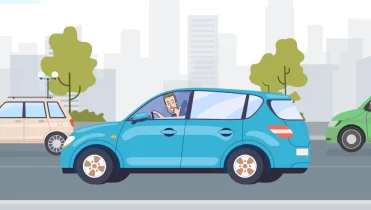less than
2 mins
- Home
- Personal Finance
- Guide
- Car Insurance for Roadside Assistance
Car Insurance for Roadside Assistance
Need help on the road? When you take out the right car insurance with roadside assistance, you can be back on your way faster. Don’t let a flat tyre, dead battery or something more serious ruin your day – adding roadside assistance to your comprehensive car insurance can save you stress and out-of-pocket costs.
Key Points
Roadside assistance can help with flat tyres, dead batteries, towing and more.
Many insurers have 24/7 roadside help as standard, no matter who’s driving.
Roadside assistance can be taken out as a standalone product or bundled with comprehensive car insurance.
What is roadside assistance?
Roadside assistance is a service that helps drivers when their car breaks down. You might’ve locked your keys inside or run out of petrol, or maybe you need a jump-start – car insurance with roadside assistance means help is just a phone call away.
Most roadside assistance policies cover:
Flat battery assistance with a jump-start or replacement (if needed).
Help changing your tyre or inflating it.
Emergency petrol delivery – enough to get you to the nearest servo.
Help if you’re locked out of your car.
If the issue can’t be fixed roadside, you’ll be towed to the nearest repairer (within a specified distance).
How does car insurance with roadside assistance work?
When you take out comprehensive car insurance with roadside assistance, you’ll usually get access to 24/7 roadside help. In the event of a breakdown, simply call your insurer’s roadside assistance hotline. They’ll either send someone out to assist you straight away or they’ll arrange for your car to be towed.
If you prefer a bit more flexibility to your insurance, some providers also sell roadside assistance as a standalone product, meaning you can add it to any type of car insurance – not just comprehensive cover, but potentially third-party car insurance as well.
What does roadside assistance cost?
The amount you pay for car insurance roadside assistance will depend on:
Your insurer.
The amount of cover taken out.
Whether it’s bundled with car insurance or bought separately.
Bundled roadside assistance will be an additional cost on top of your regular car insurance premiums, whereas standalone policies from motoring clubs like NRMA, RACQ, and RACV will have their own pricing structure.
Does car insurance include roadside assistance automatically?
Not always. While some comprehensive car insurance policies include roadside assistance as standard, others sell it as an optional extra. If you want car insurance that includes roadside assistance, make sure you check the policy details before signing up.
Is roadside assistance worth it?
In almost every case: yes. If you drive regularly or take long trips, roadside assistance can be an invaluable safety net. It means you won’t be stung with huge out-of-pocket bills when your car unexpectedly breaks down. Even if you don’t drive that often, having roadside assistance can give you peace of mind – especially for older cars that are more prone to mechanical issues.
Compare & SaveHow Roadside Assistance Works:
If you’re stranded, the process typically involves a few steps:
A phone consultation to troubleshoot your car’s issue remotely.
Dispatching a mobile technician if your problem persists.
Cover for towing your car to a repair workshop if on-site assistance fails. A surcharge may apply for towing beyond a specified distance.
What to look for in the best car insurance with roadside assistance
| What to check |
|---|---|
Inclusions | What’s actually covered – flat batteries, towing, emergency petrol, etc. |
Callout limits | Some policies limit the number of free callouts per year. |
Towing distance | Check how far they’ll tow your car at no cost. |
Availability | Look for 24/7 coverage across all of Australia. |
Driver cover | Some policies cover the vehicle regardless of who’s driving, while others only cover nominated drivers. |
Learn more about car insurance with these guides
Finding the Cheapest Roadside Assistance Policy:
When you’re comparing policies, consider more than just your annual premium. Think about how often you drive, and how reliable your car is for long and short trips. Tailor your choice to suit your specific needs:
Stick with your current insurer for basic cover if you're happy with your comprehensive policy.
Opt for higher-end cover with membership services like NRMA or RACV for premium services and perks.
Consider standalone pay as you drive services if you prefer a per-callout payment model.
If you enjoy perks, membership services like NRMA and RACV offer various discounts.
Exclusions and Considerations:
While roadside assistance is invaluable, it comes with certain exclusions, such as:
Excludes coverage for accident-related damage.
Battery replacements may incur additional charges.
Some providers may have age limits for covered vehicles.
Towing distances may be limited, with surcharges for longer distances.
Pre-existing conditions may result in extra charges.
Assistance may not be provided for unattended vehicles or commercial vehicles.
Limits on vehicle size and weight may apply.
Bogged vehicles may be assisted only if safe retrieval is possible.
Surcharges may apply for breakdowns in remote areas.
Extreme environmental conditions may impact service availability.
What's new in car insurance - Feb 2025
Cheaper cover: A few providers have slashed prices for comprehensive policies.
EV insurance: Cover options are expanding as more Aussies go electric.
Tech-driven savings: Telematics are driving discounts for safer drivers.
Frequently Asked Questions
Does roadside assistance count as a claim?
A roadside assistance callout typically does not count as a car insurance claim. However, frequent callouts may lead to premium increases by your car insurance provider.
Can I call a provider if I'm not a member?
Anyone can call roadside assistance providers for help, but a substantial service or joining fee may be required before they’ll dispatch their callout mechanic. This would be in addition to any other charges you’re required to pay.
Stand-alone companies may charge a flat rate per incident, potentially offering a cost-effective solution if you don’t drive - or break down - very often.
Can I get roadside assist if I'm not in my usual car?
Roadside assistance is usually vehicle-specific, ie, it covers your car, not the driver. Additional fees may apply if the specific vehicle in need isn’t covered for your callout.
Does roadside assistance come to your house?
Yes, most roadside assistance policies offer assistance at your home for issues like flat batteries or tyres.
Can you cancel roadside assistance?
Cancellation is possible at any time, but refunds are unlikely, except within the cooling-off period.
How do I renew my roadside assistance?
Renewal processes vary by provider, but in most cases, your cover will automatically renew unless you communicate otherwise.
What type of vehicles cannot be covered by roadside assistance?
Certain vehicles may not be covered due to their weight and height restrictions, including trucks, buses, taxis, limousines, rental or commercial vehicles, motorised homes, unregistered vehicles, tractors, and those used for racing or motor sports.
Conclusion
Understanding the ins and outs of roadside assistance is important for every driver. Experts can provide clarity on your cover options, ensuring you’re informed about this essential service.
Sources
Transport NSW
Vic Roads
Budget Direct car accident statistics ^Based on average premiums from GIO, Allianz, NRMA & Youi.
Things You Should Know
Compare Club Car Insurance is an online financial comparison service and is owned and operated by Compare Club Australia Pty Ltd (ACN 634 600 007). Compare Club does not compare all brands or all products offered by all brands.
The financial products compared on this website do not necessarily compare all features that may be relevant to you. Please check with a financial professional before you make any major financial decisions.
Any advice given here is general and has been prepared without considering your current objectives, financial situation or needs. Therefore, before acting on this advice, you should consider the appropriateness of the advice having regard to those objectives, situation or needs.
You should consider the insurers PDS prior to making the decision to purchase their product. For more information please read our Financial Services Guide (FSG) which contains further information about how our service works and how we make money.
Paul Coughran is the General Manager of Emerging Verticals at Compare Club. Paul has over 20 years of experience across a wide range of industries including Banking and Finance, Telecommunications and Energy. Paul leads a team of trusted experts dedicated to helping individuals make informed decisions about their insurance and utilities needs.

Meet our car insurance expert, Paul Coughran
Paul's top car insurance tips:
- 1
Regularly compare your insurance policies – You could be paying for cover you don’t need. Shopping around every so often can save you a fair bit, maybe even hundreds each year.
- 2
Don’t just look at the premium—check the excess too. While a higher excess might bring down your premium, remember you’ll have to fork out more if you do need to claim.
- 3
Double-check what’s included in your policy. Extras like windscreen cover or roadside assistance might not be part of the deal and could cost you more.
- 4
If you don’t drive much, consider usage-based insurance. Some policies base your cost on how much you actually drive, if you work from home or only use your car for short trips this might be a much better option.



